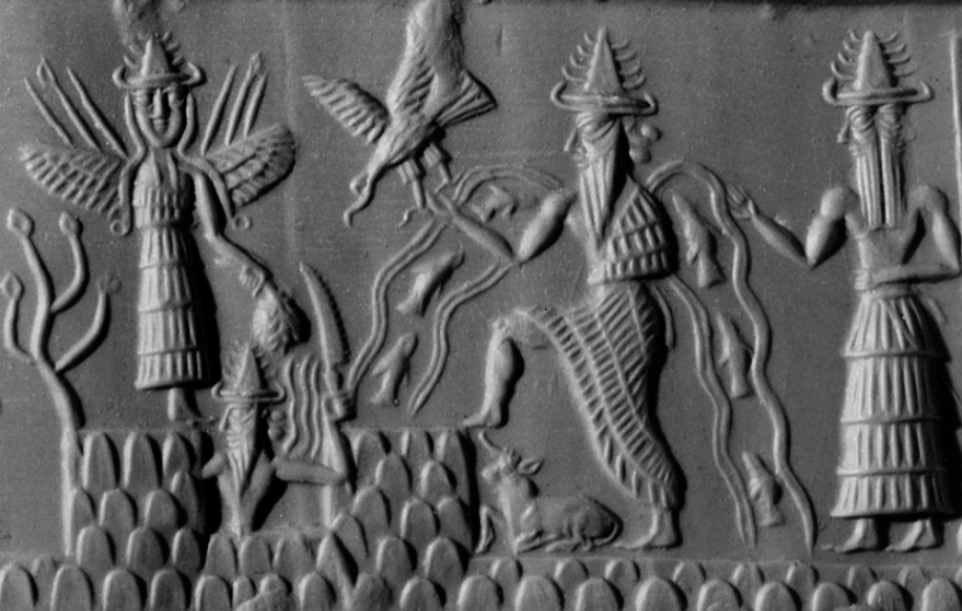
RESEARCH CENTER OF ANCIENT NEAR EASTERN AND MEDITERRANEAN CULTURES (CAEMC)
ICAEM 2023: ANGRY GODS: divine wrath and the human sphere in Ancient Near Eastern and Mediterranean cultures
2–4 June 2023
Lossi 3, Tartu
General information
The conference takes place onsite in Tartu, Estonia, but sessions will also be streamed via Zoom, to give access to a wider audience (link). Due to unforeseen circumstances, a couple of papers are prerecorded. Some of the presentations will be recorded and will be available on the YouTube channel of CAEMC.
KEYNOTE SPEAKERS
Hugh Bowden (King’s College London, UK): Recognising divine wrath in fifth-century Athenian history
Sebastian Fink (University of Innsbruck, Austria): A woman’s wrath versus the worldorder: The case of Inanna
PROGRAMME
Note that all times are according to EEST
(Eastern European Summer Time)
See https://www.thetimezoneconverter.com/ to check your local times.
FRIDAY, 2 June 2023
9.00–9.15 Opening
9.15–10.10 KEYNOTE: Sebastian Fink (Innsbruck), A woman’s wrath versus the worldorder: The case of Inanna
10.10–10.45 Vladimir Sazonov (Tartu), The end of the Akkadian Empire – a revenge of the angry gods: The Curse of Agade and the case of Unheilsherrscher
10.45–11.00 Coffee pause
11.00–11.35 Joseph Barber (Oxford), The Mythological Past and Ritual Present in the Hittite Disappearing God Texts
11.35–12.10 Laura Puértolas Rubio (Barcelona), Hittites and their Relationship with Divine Anger in Witchcraft Contexts
12.10–14.00 Lunch break
14.00–14.35 Gustavo Fernandes Pedroso (Oxford), Marduk’s Emotional Duality in Ludlul Bēl Nēmeqi and Akkadian Penitential Prayers
14.35–15.10 Joanna Töyräänvuori (Helsinki), The Birth of Penitential Poetry as Response to Divine Wrath at the Collapse of the Bronze Age
15.10–15.25 Coffee pause
15.25–16.00 Brendan Osswald (Heidelberg), The use of the word θεομηνία in the Chronographia attributed to John Malalas
16.00–16.35 Andreas Johandi (Tartu), The calm after the storm: Notes on relenting gods in Ludlul bēl nēmeqi and The Book of Job
19.00 Reception
SATURDAY, 3 June 2023
9.00–9.55 KEYNOTE: Hugh Bowden (London), Recognising divine wrath in fifth-century Athenian history
9.55–10.30 Ronald Blankenborg (Nijmegen), Live and Let Die: Personalized Justice in Homer’s Odyssey
10.30–10.45 Coffee pause
10.45–11.20 Elo-Mall Toomet (Tartu), The wrath of Hera: an aspect of the advent goddess?
11.20–14.00 Lunch break
14.00–14.35 Mait Kõiv (Tartu), Athena, Choira and humiliated Spartans: angry heroines and goddesses in Greek cultic traditions
14.35–15.10 Giovanni Brandi Cordasco Salmena, Magica Incantamenta. Religio and deviations in ancient Roman law until the advent of the principality. On the difficult reading of Tab. VIII, 8a and of Tab. VIII, 8b
15.10–15.25 Coffee pause
15.25–16.00 Pavel Čech (Prague), A woman’s wrath versus the worldorder: The case of Anat
16.00–16.35 Leif Inselmann (Göttingen), Singing the Goddess’s Wrath: Divine Anger Management in the Old Babylonian Song of Agušaya
16.35–17.10 Martin Lang (Innsbruck), Divine Wrath in Prayers and Literary Texts of the Ancient Near East: Similarities and Differences
SUNDAY, 4 June 2023
9.00–9.35 Takayoshi Oshima (Uppsala), De Ira Dei: The Unpredictability of Divine Anger and the Perplexing Nature of Divine Justice in Cuneiform Wisdom Literature
9.35–10.10 Amar Annus (Tartu), Divine Anger as a manifestation of supernatural agency in Ancient Mesopotamia
10.10–10.25 Coffee pause
10.25–11.00 Sona Eypper (Berlin), A Relationship of Unequal Mesopotamian Partners: Angry Deity, Desperate Man
11.00–11.35 Krzysztof Ulanowski (Gdańsk), Furious like Alexander. The Patterns of “Eastern” Behavior in the Biography of the Macedonian king (of the kings)
11.35–12.00 Concluding remarks
12.00 Lunch
14.00 Excursion to Tallinn
Conference description
Humans have constantly struggled to understand the divine will and to cope with it. The gods are supposed to rule the world and hopefully protect order in both nature and human society, responsible for life in heaven and on earth, in all spheres of their domain. Social norms, morals and laws are usually thought to be divinely guaranteed, with the gods expected to respond to transgressions and punish offenders. Natural as well as human disasters are often seen as manifestations of the gods’ wrath. At the same time, the divine world is often imagined like a human society, the gods are supposed to share human characteristics, including vanity and egoism, to be motivated by jealousy and envy. They must be appeased with sacrifices and precious donations, while failure to pay due respect will cause their anger and revenge.
However, the anger of the gods remains largely unpredictable. Even the faithful following of the accepted norms and dedicated honouring of the divinities will not grant their benevolence, nor does the divine reaction always seem just to the people. Crimes can remain unpunished, innocents can suffer and disasters often occur in apparently a random way. Managing the wrath of the gods has remained a constant challenge, often a mystery, for humans throughout the ages.
The responses to this challenge can vary between individuals, and between cultures and religions. The ways of the gods matter to all humans, regardless of their gender and social position, the solutions are sought through both ritual practice and moral behaviour, and the related problems are reflected, directly or not, in a variety of sources including prayers, hymns, epic, lyric poetry, drama, novel, history writing, philosophical tractates etc. The views expressed allow insight, besides religious thought, into social relations, political order, literary conventions, and thereby the overall cultural code.
The purpose of the conference will be to discuss the whole complex of the related questions in the Ancient Near Eastern and Mediterranean cultures developing in Mesopotamia, Egypt, Iran and Anatolia, Levant and Israel, Greece and Rome. We expect papers concerning the variety of approaches to describing and interpreting divine anger and revenge, its causes, manifestations and results, the human response. The papers can concern religious, social, political, cultural and other aspects of this complex field, covering the period from the emergence of the civilisations until late Antiquity.
***


